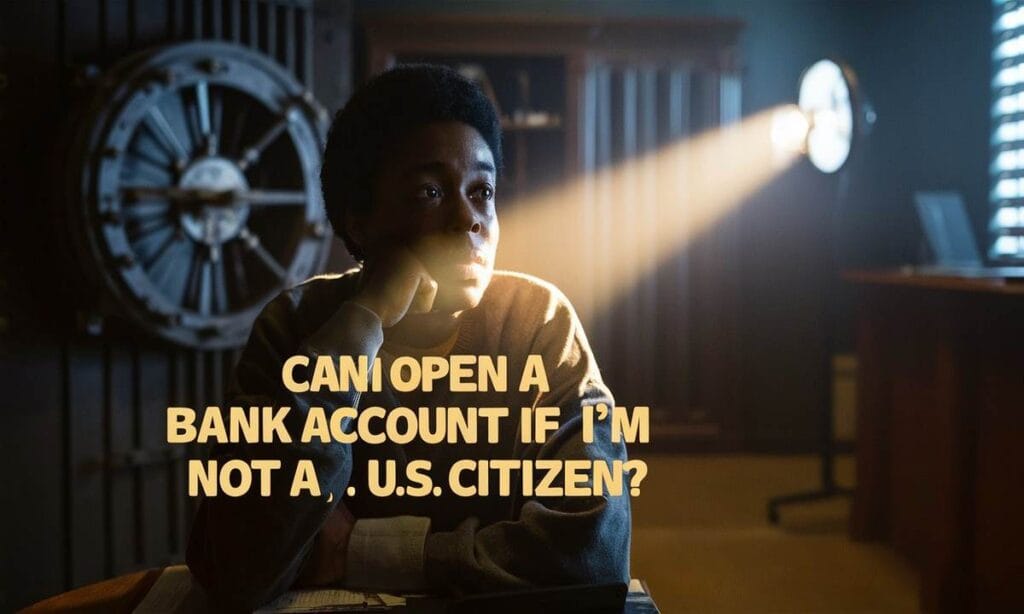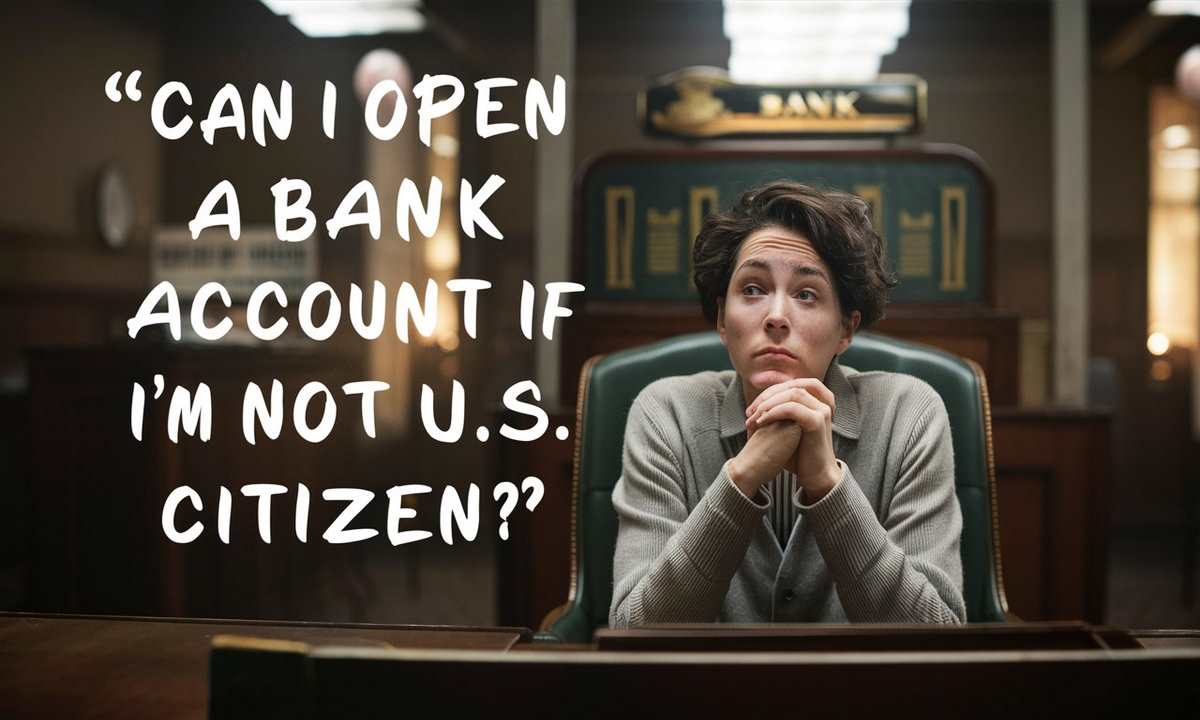In a globalized world where financial transactions cross borders daily, the ability for non-U.S. citizens to Open a Bank Account in the United States is both a practical necessity and a strategic advantage. For many, this need arises from relocation, international business dealings, or investment opportunities. Understanding the landscape of U.S. banking for non-citizens can be complex, but it is crucial for effective financial management. This guide elucidates the key aspects and steps involved in securing a Bank Account in the U.S., providing clarity for those navigating this financial terrain.

TAKING in Banking Basics for Non-U.S. Citizens
Navigating the U.S. banking system can be a daunting endeavor for non-citizens. The U.S. financial landscape is characterized by a range of account types, regulatory requirements, and banking practices that may differ significantly from those in other countries. Familiarizing oneself with the basic principles of banking in the U.S. is essential for making informed decisions. This includes understanding the functions of various account types, the role of banking institutions, and the financial services available to non-citizens.
Why Opening a Bank Account Matters for Non-U.S. Citizens
For non-U.S. citizens, having a Bank Account in the United States can streamline numerous financial activities. From facilitating international transactions to managing day-to-day expenses, a U.S. Bank Account can simplify financial operations and offer access to various banking products and services. Additionally, possessing a U.S. Bank Account can enhance one’s credibility and facilitate smoother interactions with U.S.-based businesses and service providers.
Eligibility Criteria for Non-U.S. Citizens
What Banks Require from Non-U.S. Citizens
Banks in the United States have specific requirements for non-citizens wishing to open accounts. Typically, institutions require proof of identity, proof of legal status in the U.S., and documentation supporting the applicant’s current address. Banks may also assess the applicant’s financial background and purpose for opening the account to ensure compliance with federal regulations.
Types of Non-U.S. Citizens Who Can Open Accounts
Various categories of non-U.S. citizens may open Bank Accounts in the U.S., including international students, foreign workers, and expatriates. Each category has distinct requirements and may be subject to different regulations based on their visa status or employment situation. Understanding these distinctions can help in selecting the appropriate type of account and banking services.

Required Documentation
Essential Documents for Opening a Bank Account
To Open a Bank Account, non-U.S. citizens generally need to provide several key documents. These typically include a valid passport, proof of visa or immigration status, and evidence of a U.S. address. The exact requirements may vary by bank, so it is advisable to check with the specific institution for their documentation needs.
How to Obtain a Tax Identification Number (ITIN)
An Individual Taxpayer Identification Number (ITIN) is often required for non-U.S. citizens who do not have a Social Security Number (SSN). The ITIN can be obtained from the Internal Revenue Service (IRS) and is essential for tax reporting and financial transactions. Application for an ITIN involves submitting Form W-7 along with required documentation to the IRS.
Using an International Passport for Banking
An international passport serves as a primary form of identification for non-U.S. citizens opening a Bank Account. It must be current and include a photograph and relevant personal details. Some banks may require additional forms of identification, such as a national ID card or driver’s license from the applicant’s home country.
Proof of Address: What You Need to Know
Proof of address is a crucial requirement for opening a Bank Account. Non-U.S. citizens must provide documentation that verifies their residential address in the U.S. This could include utility bills, lease agreements, or official correspondence from a U.S. institution. Ensuring that these documents are recent and accurately reflect the current address is vital.
Types of Bank Accounts Available
Checking Accounts for Non-U.S. Citizens
Checking accounts are designed for everyday transactions, including deposits, withdrawals, and bill payments. For non-U.S. citizens, these accounts offer essential features such as online banking, debit card access, and the ability to manage funds efficiently. Banks may offer various types of checking accounts with differing features and fees.
Savings Accounts: Options for International Clients
Savings accounts provide a means to earn interest on deposited funds while maintaining accessibility. Non-U.S. citizens can choose from a range of savings accounts, which vary in interest rates, minimum balance requirements, and withdrawal terms. These accounts are suitable for long-term financial planning and savings goals.
Specialized Accounts for Foreign Nationals
Some banks offer specialized accounts tailored for foreign nationals, including accounts designed for international investors or business owners. These accounts may come with unique benefits such as multi-currency options or investment advisory services, catering to the specific needs of international clients.

How to Open a Bank Account
Step-by-Step Process for Non-U.S. Citizens
Opening a Bank Account involves several key steps. Initially, non-U.S. citizens must select a bank that meets their needs and gather the required documentation. The next step typically involves completing an application form, either online or in-person, and submitting the necessary documents. Following this, the bank will review the application and may request additional information before finalizing the account setup.
Online Banking Applications: What to Expect
Many banks offer online applications for convenience. Applicants will need to complete a digital form, upload required documents, and verify their identity through secure online methods. It is important to follow the bank’s instructions carefully and ensure that all information provided is accurate to avoid delays.
In-Person Bank Visits: What to Bring
For those preferring to open an account in person, visiting a bank branch is an option. It is essential to bring all necessary documents, including identification and proof of address. During the visit, a bank representative will assist with the application process, answer any questions, and provide information about account features and terms.
Banking Options for International Students
Opening a Bank Account as an International Student
International students often require a Bank Account to manage their finances while studying in the U.S. Banks may offer student accounts with benefits such as waived fees and flexible terms. Students should provide proof of enrollment, a valid passport, and a student visa to qualify for these accounts.
Student Banking Services and Benefits
Student banking services typically include features such as no monthly fees, easy online access, and tools for budgeting and financial management. These services are designed to support students in managing their finances effectively while pursuing their education.
Bank Accounts for Foreign Workers
Banking Solutions for Foreign Employees
Foreign workers in the U.S. may need a Bank Account for salary deposits and financial transactions. Banks offer various account options suitable for employees, including accounts with payroll deposit features and easy access to funds. Providing proof of employment and visa status is generally required.
Navigating Employment Verification and Banking
Employment verification is a key step in the banking process for foreign workers. Banks may require documentation from the employer confirming employment status and salary details. Ensuring that this documentation is complete and accurate can facilitate the account opening process.
Challenges and Common Issues
Dealing with Language Barriers in Banking
Language barriers can pose challenges when navigating the U.S. banking system. Many banks offer multilingual services or support for non-English speakers, but it is advisable to seek institutions with adequate language support to avoid misunderstandings.
Overcoming Issues with Credit History and Banking
Non-U.S. citizens may face difficulties with credit history, especially if they lack a U.S. credit history. Banks may offer solutions such as secured credit cards or alternative credit evaluation methods to help individuals establish or build their credit profiles.
Banking Regulations and Legal Considerations
U.S. Banking Regulations Affecting Non-Citizens
Non-U.S. citizens must adhere to U.S. banking regulations, which include compliance with anti-money laundering laws and financial reporting requirements. Understanding these regulations helps ensure that banking activities remain within legal boundaries.
TAKING in the Patriot Act and Financial Regulations
The Patriot Act imposes specific requirements on financial institutions to verify the identity of their clients. Non-U.S. citizens must be aware of these regulations, which are designed to prevent illegal activities and ensure transparency in financial transactions.
Fees and Charges
Potential Fees for Non-U.S. Citizens
Fees associated with Bank Accounts may vary depending on the bank and account type. Non-U.S. citizens should be aware of potential fees such as account maintenance fees, transaction fees, and international wire transfer charges. Comparing fees across different banks can help in selecting the most cost-effective option.
Comparing Fees Across Different Banks
It is prudent to compare fees and charges associated with various banks to find the best account for your needs. Different banks offer different fee structures and services, so reviewing these details can aid in making an informed choice.
Banking Services and Features
International Wire Transfers: What You Need to Know
International wire transfers are a common service for non-U.S. citizens. Understanding the process, fees, and exchange rates involved can help in managing cross-border transactions efficiently. Many banks offer online tools for tracking and managing wire transfers.
Accessing Online and Mobile Banking
Online and mobile banking services provide convenient access to account management. Non-U.S. citizens should ensure that their bank offers robust online and mobile platforms with features such as account monitoring, fund transfers, and transaction alerts.
Building Credit as a Non-U.S. Citizen
Establishing a Credit History in the U.S.
Building a U.S. credit history can be challenging but is essential for future financial activities. Non-U.S. citizens can establish credit by maintaining a Bank Account, using credit cards responsibly, and paying bills on time. Over time, these activities contribute to a positive credit history.
The Role of Bank Accounts in Building Credit
Bank Accounts play a role in establishing credit by providing a financial history that can be reviewed by credit agencies. Maintaining a positive banking relationship and demonstrating financial responsibility can positively impact
creditworthiness.
Alternatives to Traditional Bank Accounts
Prepaid Cards and Virtual Accounts
For those who may not meet the requirements for traditional Bank Accounts, prepaid cards and virtual accounts offer viable alternatives. These options provide functionality similar to Bank Accounts, such as making purchases and managing funds, without the need for a traditional Bank Account.
Using International Banks with U.S. Branches
International banks with branches in the U.S. can offer familiar banking services to non-U.S. citizens. These banks may provide tailored services and account options that cater to international clients, making the banking experience more seamless.
How to Maintain Your Bank Account
Keeping Your Account Active and Avoiding Closure
To keep a Bank Account active, it is important to regularly use the account and maintain the minimum balance requirements set by the bank. Avoiding inactivity fees and ensuring that the account remains in good standing is crucial for long-term account maintenance.
Updating Your Information and Address Changes
Keeping personal information up-to-date with the bank is essential. This includes notifying the bank of address changes, changes in employment status, or other relevant information to ensure that account details remain accurate and that communication from the bank is received.
Referrals and Recommendations
Banks with Best Services for Non-U.S. Citizens
Some banks are renowned for their services tailored to non-U.S. citizens. These institutions offer specialized accounts, multilingual support, and international banking services that cater specifically to the needs of foreign clients.
Tips from Financial Experts for International Clients
Financial experts recommend thoroughly researching banking options, understanding the fees and services associated with different banks, and seeking institutions with a strong reputation for supporting non-U.S. citizens. Engaging with financial advisors or consultants can also provide valuable guidance.
BOTTOM LINE
Navigating the process of opening a Bank Account as a non-U.S. citizen involves understanding eligibility requirements, preparing the necessary documentation, and selecting the right banking options. By following the outlined steps and being aware of potential challenges, non-U.S. citizens can successfully manage their financial needs in the U.S. This guide serves as a comprehensive resource for making informed banking decisions and optimizing financial management in a foreign country.
Frequently Asked Questions (FAQs)
What documents do I need to Open a Bank Account?
To Open a Bank Account, you typically need to provide several key documents. These often include a valid photo ID (such as a passport or driver’s license), proof of address (like a utility bill or lease agreement), and your Social Security Number (SSN) or Tax Identification Number (TIN). Some banks may also request additional documents, such as proof of income or employment.
How old do I have to be to Open a Bank Account?
In most cases, you must be at least 18 years old to Open a Bank Account on your own. However, minors can Open a Bank Account with the assistance of a parent or guardian. These accounts are typically joint accounts where the parent or guardian has control over the account until the minor reaches legal age.
Can I Open a Bank Account online?
Yes, many banks offer the option to Open a Bank Account online. The process usually involves completing an online application form, submitting the required documentation electronically, and verifying your identity. Online account opening is convenient and can be completed from the comfort of your home.
What is the process for opening a Bank Account?
The process for opening a Bank Account generally involves choosing a bank and account type, completing an application form, providing required documents, and funding the account. After submitting your application, the bank will review it and may require additional verification before the account is officially opened.
How long does it take to Open a Bank Account?
The time it takes to Open a Bank Account can vary. Online applications can be processed within minutes to a few days, depending on the bank’s procedures and whether additional verification is needed. In-person applications typically take less time, often being completed within an hour if all documentation is in order.
Is there a minimum deposit required to Open a Bank Account?
Many banks require a minimum deposit to open an account, though the amount can vary widely. Some accounts may have no minimum deposit requirement, while others might require a deposit ranging from $25 to several hundred dollars. It is important to check the specific requirements of the account you are interested in.
Can I Open a Bank Account with a bad credit history?
Yes, you can Open a Bank Account with a bad credit history. Bank Accounts, particularly checking and savings accounts, are generally not affected by your credit score. However, if you have a history of banking issues, such as account closures or overdrafts, banks may review your past banking behavior.
What types of Bank Accounts can I open?
You can open various types of Bank Accounts, including checking accounts, savings accounts, money market accounts, and certificates of deposit (CDs). Each type of account serves different financial needs, such as everyday transactions, savings with interest, or short-term investments.
Are there fees associated with opening a Bank Account?
Some banks charge fees for opening an account, such as account setup fees or monthly maintenance fees. However, many banks offer accounts with no opening fees or maintenance fees if certain conditions are met, such as maintaining a minimum balance or setting up direct deposit.
How do I choose the right Bank Account for me?
Choosing the right Bank Account involves considering your financial needs and goals. Factors to consider include the account features, fees, interest rates, accessibility, and any additional services offered. Comparing different accounts and reading customer reviews can help you find an account that best suits your needs.
Can I open a joint Bank Account?
Yes, you can open a joint Bank Account with one or more people. Joint accounts allow multiple individuals to access and manage the account together. This type of account is useful for managing shared expenses or for family members who need access to the same funds.
What is a Bank Account verification process?
The Bank Account verification process involves confirming the identity and validity of the account holder’s information. This can include verifying personal details, checking documentation, and sometimes performing background checks. Verification ensures that the account is opened by a legitimate individual.
Do I need to visit a branch to Open a Bank Account?
While many banks offer online account opening options, some still require you to visit a branch to complete the process. This is particularly true for accounts that require in-person identity verification or if the bank has specific requirements that necessitate a face-to-face visit.
How do I close a Bank Account?
To close a Bank Account, you typically need to visit the bank in person or request closure through an online or phone process. Ensure all pending transactions are complete and the account balance is zero before closing. After the account is closed, confirm that there are no remaining fees or issues.
Can I Open a Bank Account if I’m not a U.S. citizen?
Yes, non-U.S. citizens can Open a Bank Account in the U.S. by providing necessary documentation such as a valid passport, proof of address, and a Tax Identification Number (ITIN) or Social Security Number (SSN). Requirements can vary by bank and account type.
What is the difference between a checking account and a savings account?
A checking account is designed for everyday transactions such as deposits, withdrawals, and bill payments. It typically offers easy access to funds and may come with a debit card. A savings account, on the other hand, is intended for saving money with interest accumulation and usually has limited access compared to checking accounts.
Can I open a business Bank Account online?
Yes, many banks offer the option to open a business Bank Account online. The process typically involves completing an online application, providing required business documentation, and verifying your identity. The specific requirements may vary depending on the bank and the type of business.
How can I add someone to my Bank Account?
To add someone to your Bank Account, you typically need to visit the bank with the individual you wish to add. You will need to provide personal identification for both parties and complete any necessary forms to establish joint access or authorization.
What should I do if my Bank Account application is denied?
If your Bank Account application is denied, contact the bank to understand the reason for the denial. You can address any issues or correct inaccuracies in your application. Additionally, consider reviewing your credit report or financial history and applying with a different bank if necessary.
Can I open multiple Bank Accounts at different banks?
Yes, you can open multiple Bank Accounts at different banks. Many people choose to do this to take advantage of different features, interest rates, or benefits offered by various banks. Just ensure you manage each account carefully to avoid any complications.








